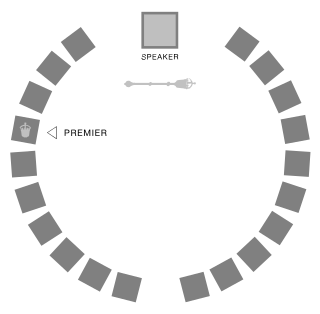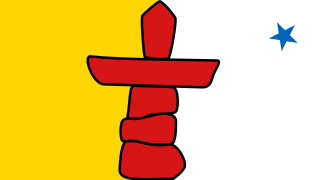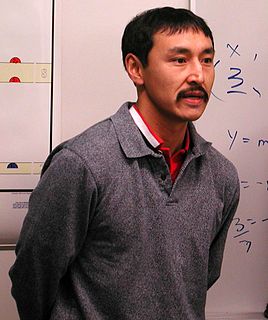The Nunavut general election, 2004 was the second general election held in the Canadian territory. It was held on February 16, 2004, to elect the 19 members of the 2nd Legislative Assembly of Nunavut.
In Canada, a premier is the head of government of a province or territory. Though the word is merely a synonym for prime minister, it is employed for provincial prime ministers to differentiate them from the Prime Minister of Canada. There are currently 10 provincial premiers and three territorial premiers. These persons are styled The Honourable only while in office, unless they are admitted to the Queen's Privy Council for Canada, in which case they retain the title even after leaving the premiership.

The Legislative Assembly of Nunavut, Canada, is located in Iqaluit, and is the territory's parliament.

The history of Northwest Territories capital cities begins with the purchase of the Territories by Canada from the Hudson's Bay Company in 1869, and includes a varied and often difficult evolution. Northwest Territories is unique amongst the other provinces and territories of Canada in that it has had seven capital cities in its history. The territory has changed the seat of government for numerous reasons, including civil conflict, development of infrastructure, and a history of significant revisions to its territorial boundaries.
Elections NWT is an independent, non-partisan public agency responsible for the administration of territorial general elections, by-elections, and plebiscites in accordance with the Elections and Plebiscites Act. Elections NWT is headed by the Chief Electoral Officer, an officer of the Legislative Assembly of the Northwest Territories.
Edward "Ed" Walter Picco is a Canadian Nunavut, politician first elected in the 1995 Northwest Territories election. He was re-elected in the 1999 Nunavut election and in the 2004 Nunavut election. Picco is one of the few Canadian politicians elected to two different legislative assemblies, having been elected in 1995 to the Legislative Assembly of the Northwest Territories and in 1999 to the Legislative Assembly of Nunavut.
Tagak Curley is an Inuit leader, politician and businessman from Nunavut. As a prominent figure in the negotiations that led to the creation of Nunavut, Tagak is considered a living father of confederation in Canada. He was born in a hunting camp at Coral Harbour, Northwest Territories.
James Arreak is a territorial and municipal level politician in Canada. He has served as a member of both the Nunavut and Northwest Territories legislatures.
The Speaker of the Legislative Assembly of Nunavut is the presiding officer of the territorial legislature in Nunavut, Canada. Since 1999 the position has been elected by Members of the Legislative Assembly (MLAs) using a secret ballot. The Speakership is currently vacant.

Nunavut is the newest, largest, and most northerly territory of Canada. It was separated officially from the Northwest Territories on April 1, 1999, via the Nunavut Act and the Nunavut Land Claims Agreement Act, though the boundaries had been drawn in 1993. The creation of Nunavut resulted in the first major change to Canada's political map since the incorporation of the province of Newfoundland in 1949.
This article provides a timeline of elections in Canada, including all the provincial, territorial and federal elections. The information starts from when each province was formed or entered the Confederation, and continues through to the present day.
Gooteleah "Goo" "Mosa" Arlooktoo was a Canadian politician and former cabinet minister from Northwest Territories, Canada. He briefly served as acting premier of the territory.
Titus Allooloo is a business man and former territorial level politician from Nunavut, Canada. He served as a member and cabinet Minister of the Northwest Territories Legislature through two terms from 1987 until 1995.

Eva Qamaniq Aariak is a Canadian Inuk politician, who was elected in the 2008 territorial election to represent the electoral district of Iqaluit East in the Legislative Assembly of Nunavut. She was subsequently chosen as the second Premier of Nunavut, under the territory's consensus government system, on November 14, 2008. Aariak was the fifth woman to serve as a premier in Canada.

The 2013 Nunavut general election, formally the 4th Nunavut general election, was held October 28, 2013, to elect 22 members to the 4th Legislative Assembly of Nunavut. In November 2012 the assembly passed the Nunavut Elections Act 2012, stating that the writs for election drop September 23, 2013, and an election be held October 28, 2013, the proclamation was registered November 9, 2012. At the 2013 forum, held on November 15, 2013, Peter Taptuna was selected as the new Premier of Nunavut.

The Nunavut general election, 2017 was held in the Canadian territory of Nunavut on October 30, 2017 to return the members of the 5th Nunavut Legislature. The fifth general election held since the creation of the territory in 1999, it was the first election held under Nunavut's new fixed election dates law, which requires elections to be held no more than four years after the prior election.








